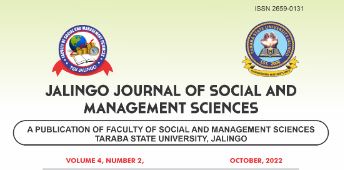Fiscal Instability and Economic Growth in Nigeria: Evidence from a Vector Error Correction Model
Keywords:
Fiscal Instability, Economic Growth, Vector Error Correction ModelAbstract
Oil-dependent developing countries like Nigeria are often subjected to fiscal instability. Invariably, fiscal instability is deleterious to rapid and steady economic growth. The main aim of this paper is to investigate the relationship between fiscal instability and economic growth in Nigeria using the technique of vector error correction modelling covering the period of 1982 to 2021. The results of the multivariate co-integration test based on Johansen’s co-integration technique confirm the existence of co-integrating equations among the variables. Since the variables are co-integrated, the existence of a stable long-run relationship between the growth rate of real GDP, exports, exchange rate, and real investment is confirmed. The error correction model parameter (ECM) is negatively signed and less than unity in absolute value as required. However, the parameter is not significantly different from zero at the 5% level. Real investment is positively signed and passes the significance test at the 5% confidence level. The coefficient of fiscal instability is positively signed but not significantly different from zero at the 5% level. The coefficient of exchange rate is positive and highly significant, easily passing the significance test at the 5% confidence level. However, the coefficient of exports, though positively signed as required, does not pass the significance test at the 5% level. Thus, the study recommends that, fiscal discipline is required to ensure a sustainably stable economic growth in Nigeria.

Downloads
Published
Issue
Section
License
Copyright (c) 2023 JALINGO JOURNAL OF SOCIAL AND MANAGEMENT SCIENCES

This work is licensed under a Creative Commons Attribution-NonCommercial 4.0 International License.
